- Home
- Clive Barker
Galilee Page 5
Galilee Read online
Page 5
“Seems to me you’ve got reason to keep the crib.”
He grunted by way of reply. Then he went over to the table and sat on the chair beside it. “Don’t you wonder sometimes . . . ?” he began.
“Wonder what?”
“Why one of us gets put in a madhouse an’ another gets to be a cripple an’ another gets to go ’round the world fuckin’ every beautiful woman he sets his eyes on.”
This last, of course, was Galilee; or at least the Galilee of family myth: the wanderer, pursuing his unattainable dreams from ocean to ocean.
“Well don’t you wonder?” Luman said again.
“Now and again.”
“See, things ain’t fair. That’s why people go crazy. That’s why they get guns and kill their kids. Or end up in chains. Things ain’t fair!” He was beginning to shout again.
“If I may say . . .”
“Say what the fuck you like!” he replied, “I want to hear, brother.”
“ . . . we’re luckier than most.”
“How’d you reckon that?”
“We’re a special family. We’ve got . . . you’ve got talents most people would kill to have . . .”
“Sure I can fuck a woman then make her forget I ever laid a finger on her. Sure I can listen in on one snake’s sayin’ to another. Sure I got a Momma who used to be one of the all time great ladies and a Poppa who knew Jesus. So what? They still put me in chains. And I still thought I deserved it, ’cause in my heart I thought I was a worthless sonofabitch.” His voice dropped to a whisper. “An’ that ain’t really changed.”
This silenced me utterly. Not just the flow of images (Luman listening to snakes? My father as a confidante of Christ?) but the sheer desperation in Luman’s voice.
“We ain’t none of us what we should’ve been, brother;” he said. “We ain’t none of us done a thing worth callin’ important, an’ now it’s all over, and we ain’t never goin’ to have that chance.”
“So let me write about why.”
“Oh . . . I knew we’d get back to that sooner or later,” Luman replied. “There ain’t no use in writin’ no book, brother. It’s just goin’ to make us look like losers. ’Cept Galilee, of course. He’ll look fine an’ fancy an’ I’ll look like a fuckwit.”
“I’m not here to beg,” I said. “If you don’t want to help me then I’ll just go back to Mama—”
“If you can find her.”
“—I’ll find her. And I’ll just ask her to have Marietta show me the sights instead of you.”
“She doesn’t trust Marietta,” Luman said, getting up and crossing to crouch in front of the fire. “She trusts me because I’ve stayed here. I’ve been loyal.” His lip curled. “Loyal like a dog,” he said. “Stayed in my kennel and guarded her little empire.”
“Why do you stay out here?” I asked him. “There’s so much room in the house.”
“I hate the house. It’s entirely too civilized. I find I can’t catch my breath in there.”
“Is that why you don’t want to help me? You don’t want to go in the house?”
“Oh, shit,” he said, apparently resigned to this torment, “If I have to I have to. I’ll take you up, if you want to go that badly.”
“Up where?”
“To the dome, of course. But once I’ve done that, buddy, you’re on your own. I ain’t staying with you. Not in that place.”
VII
I began to see that one of the curses of the Barbarossa family is self-pity. There’s Luman in his Smoke House, plotting his revenge against dead men; me in my library, determined that life had done me a terrible disservice; Zabrina in her own loneliness, fat with candy. Even Galilee—out there under a limitless sky—writing me melancholy letters about the aimlessness of his life. It was pathetic. We, who were the blessed fruit of such an extraordinary tree. How did we all end up bemoaning the fact of living, instead of finding purpose in that fact? We didn’t deserve what we’d been given: our glamours, our skills, our visions. We’d frittered them all away while we bemoaned our lot.
Was it too late to change all of that, I wondered? Was there still a chance for four ungrateful children to rediscover why we’d been created?
Only Marietta, it seemed to me, had escaped the curse, and she’d done so by reinventing herself. I saw her often, coming back from her visits to the world, dressed like a trucker sometimes in low-slung jeans and a dirty shirt, sometimes like a torch-song singer in a slinky dress; sometimes barely dressed at all, running across the lawn as the sun came up, her skin as dewy as the grass.
Oh Lord, what am I admitting to? Well, it’s said; for better or worse. To my list of sins (which isn’t as long as I’d like it to be) I must now append incestuous desires.
Luman had arranged to come and fetch me at ten. He was late, of course. When he finally turned up, he had the last inch of his havana between his teeth, and the last inch of gin left in the bottle. I suspect he didn’t indulge himself with hard liquor very often, because he was much the worse for wear.
“Are you ready?” he slurred.
“More than ready.”
“Did you bring something to eat and drink?”
“What do I need food for?”
“You’re going to be in there a long time. That’s why.”
“You make it sound like I’m being locked up.”
Luman leered at me, as though he was making up his mind whether to be cruel or not. ‘Don’t be shittin’ yourself,” he said finally. “The door’ll be open all the time, you just won’t feel like leaving. It’s very addictive once you get going.” With that he started off down the passageway, leaving me to trundle behind him.
“Don’t go too fast,” I told him.
“Afraid of gettin’ lost in the dark?” he said, “Brother, you are one nervous son of a bitch.”
I wasn’t afraid of the dark, but there was good reason to be concerned about getting lost. We turned a couple of corners and I was in a passageway I was pretty certain I’d never visited before, though I’d thought myself familiar with the entire house, barring Cesaria’s chambers. Another corner, and another, and a passageway, and a small empty room, and another, and another, and now I knew this was unknown terrain. If Luman decided to play the mischief maker and leave me here, I doubted I could find my way back to anywhere familiar.
“You smell the air here?”
“Stale.”
“Dead. Nobody comes here, you see. Not even her.”
“Why not?”
“Because it fucks with your head,” he said, casting a glance back in my direction. I could barely see his expression in the musk, but I’m certain he had that yellow-toothed leer back on his face. “Of course, you’re a saner man than I ever was, so maybe it won’t bother you so much ’cause you got better control of your wits. On the other hand . . . maybe you’ll crack, and I’ll have to put you in my li’l crib for the night, so’s you don’t do yourself harm.”
I brought the chair to a halt. “You know what?” I said. “I’ve changed my mind.”
“You can’t do that,” Luman said.
“I’m telling you I don’t want to go in there.”
“Well ain’t this a flip-flop, huh? First I don’t want to take you, and now I brought you here, you don’t want to go. Make up your fuckin’ mind.”
“I’m not going to risk my sanity,” I said.
Luman drained the gin bottle. “I can see that,” he said. “I mean, a man in your condition ain’t got but his mind, right? You lose that you ain’t got nothin’.” He came a step or two toward me. “On the other hand,” he said, “If you don’t go in, you ain’t got no book, so it’s a kind of toss-up.” He lobbed the gin bottle from hand to hand, and back again, to illustrate his point. “Book. Mind. Book. Mind. It’s up to you.”
I hated him at that moment; simply because what he said was true. If he left me under the dome and I lost my sanity, I wouldn’t be capable of putting words in any sensible order. On the other hand, if I didn
’t risk the lunacy, and I simply wrote from what I already knew, wouldn’t I always wonder how much richer, how much truer, my work would have been if I’d had the courage to see what the room had to show me?
“It’s your choice,” he said.
“What would you do?”
“You’re asking me?’ Luman said, sounding genuinely surprised at my interest in his opinion. “Well it ain’t pretty being mad,” he said. “It ain’t pretty at all. But the way I see it, we don’t have a lot of time left. This house ain’t goin’ to stand forever, an’ when it comes down, whatever you might see in there . . .” he pointed along the passageway ahead of me, toward the stairs that led up to the dome “ . . . is going to be lost. You won’t be seeing no more visions when this house falls. None of us will.”
I stared at the passageway.
“I guess that’s my answer then,” I said.
“So you’re goin’ to go in?”
“I’m goin’ to go in.”
Luman smiled. “Hold on,” he said. Then he did a remarkable thing. He picked up the wheelchair, with me in it, and carried us both up the stairs. I held my breath, afraid he was either going to drop me, or topple back down the flight. But we reached the top without incident. There was a narrow landing, and a single door.
“I’m goin’ to leave you here,” Luman said.
“This is as far as you go?”
“You know how to open a door,” he said.
“What happens when I get inside?”
“You’ll find you know that too.” He laid his hand on my shoulder. “If you need anything, just call.”
“You’ll be here?”
“It depends how the mood takes me,” he said, and sauntered off down the stairs. I wanted to call him back; but I was out of delaying tactics. Time to do this, if I was going to do it.
I wheeled my way to the door, glancing back once to see if Luman was still in sight. He’d gone. I was on my own. I took a deep breath, and grasped the door handle. There was still a corner of me that hoped the door was locked and I’d be denied entry. But the handle turned, and the door opened—almost too readily, I thought, as though some overeager host stood on the other side, ready to usher me in.
I had some idea of what I thought lay on the other side, at least architecturally speaking. The dome room—or “sky room” as Jefferson had dubbed his version at Monticello—was, I’d been told by Marietta (who’d crept up there once to do the deed with a girlfriend) a somewhat strange but beautiful room. At Monticello it had apparently been used as a child’s playroom, because it was hard to access (a design deficiency which also applied to L’Enfant) but here, Marietta had told me, there was a whisper of unease in the room; no child would have been happy playing there. Though there were eight windows, after the Monticellian model, and a skylight, the place seemed to her “a little on the twitchy side,” whatever that meant.
I was about to find out. I pushed the door wide with my foot, half-expecting birds or bats to fly’ in my face. But the room was deserted. There was not so much as a single piece of furniture to spoil its absolute simplicity. Just the starlight, coming in from nine apertures.
“Luman,” I murmured to myself, “you sonofabitch . . .”
He’d prepared me for something fearful; a delirium, an assault of visions so violent it might put me out of my wits. But there was nothing here but murk and more murk.
I ventured in a couple of yards, looking everywhere for a reason to be afraid. But there was nothing. I pressed on, with a mingling of disappointment and relief. There was nothing to fear in here. My sanity was perfectly secure.
Unless, of course, I was being lulled into a false sense of security. I glanced back toward the door. It was still open; still solid. And beyond it the landing where I’d stood with Luman, and debated the wisdom of coming in here. What an easy mark I’d made; he must have been thoroughly entertained at the sight of my discomfort! Cursing him again, I took my eyes from the door and returned them to the murk. This time, however, much to my astonishment, I discovered that the sky room was not quite as empty as I’d thought. A few yards from me—at the place where the lights of the nine windows intersected—there was a skittering pattern in the gloom, so subtle I was not certain at first it was even real. I kept staring at it, resisting the urge to blink for fear that it would vanish. But it remained before me, intensifying a little. I wheeled my way toward it; slowly, slowly, like a hunter closing on his quarry, fearful of alarming it into flight. But it didn’t retreat. Nor did it become any the less mystifying. My approach had become less tentative now; I was very soon at the center of the room, directly under the skylight. The patterns were in the air all around me; so subtle I was still not absolutely certain I was ever seeing them. I looked up to my zenith: I could see stars through the skylight, but nothing that would be likely to create these shifting shadows. Returning my gaze to the walls, I went from one window to the next, looking for some explanation there. But I found none. There was a little wash of light through each of them, but no sign of motion—a wind-stirred branch, a bird fluttering on a sill. Whatever was creating this shifting shadow was here in the room with me. As I finished my study of the windows, muttering to myself in confusion, I had the uncomfortable sense my befuddlement was being watched. Again, I looked toward the door, thinking maybe Luman had crept back to spy on me. But no; the landing was deserted.
Well, I thought, there’s no use my sitting here, getting dizzy and paranoid. I may as well spit out my reasons for coming, and see if that elicited some response.
I drew an anxious breath, and spoke.
“I came . . . I came to see the past,” I said. My voice sounded tiny, like a child’s voice. “Cesaria sent me,” I added, thinking that might help whatever forces occupied the room understand that I was a legitimate presence, and that if they had something to show me, they should damned well do it.
Something that I’d said—whether it was talking about the past or about Cesaria I can’t say—brought a response. The shadows seemed to darken around me, and their motion grew more complex. Some portion of the pattern twitched like a living thing, and rose up in front of me—up, up toward the skylight. Another flew off toward the wall at my left, trailing more fragments of dark air, whipping like the tail of a kite. A third dropped to the polished boards and spread across the floor.
I believe I breathed some words of astonishment. “Oh my Lord,” or some such. I had reason. The spectacle was growing by the moment, the writhing motions of these shadows, and their scale, expanding as if by some logarithmic progression. Motion was inspiring motion; forms were inspiring forms. In the space of perhaps forty-five seconds the walls of the dome room had been all but eclipsed by these roiling abstractions; gray on gray, yet filled with subtle intimations of visions to come. My eyes were darting everywhere, of course, amazed by all this, but even as my gaze went on from one cloudy cluster of shapes to the next, it moved with the impression that something was almost visible here. That I was moments away from understanding how these abstractions worked.
And yet, even in their protean condition they moved me. Watching these roilings and cavortings I began to understand why Luman had been so reluctant to enter this room. He was a man of great vulnerability, despite his manner there was simply too much feeling here for a soul so tender. Watching the unfolding spectacle, I felt as though I were listening to a piece of music; or rather several at the same time.
Those grand shapes moving overhead, like columns of smoke passing across the sun had all the gravity of a requiem; while the forms that moved close to me reeled and swaggered as though to a drunken polka. And in between, circling me as they climbed, were sinuous ropes of ether that seemed to express lovely, rising music, like the bright line of a rhapsody.
To say I was enchanted does not begin to express my beguilement. It was all so perfectly mysterious: a seduction of eye and heart that left me close to tears. But I was not so enthralled that I didn’t wonder what powers lay so far undisc
losed. I had invited this vision with my own readiness to accept it. Now it was time to do the same thing again; to open my spirit, as it were, a little wider, and see what the shadows would show me.
“I’m ready,” I said softly, “whenever you are . . .”
The forms before me continued to profligate, but made no visible response to my invitation. There was still a sense of evolution in their motion, but I sensed that it had slowed. I was no longer seeing the heart-quickening changes that had astonished me a minute or two before.
Again, I spoke. “I’m not afraid,” I said.
Did I ever say anything so foolish in my life as to boast fearlessness in such a place as this?
The words were no sooner out of my mouth than the shadows before me convulsed, as though some seismic shock had shaken the dome. Two or three seconds later, like thunder coming a heartbeat after lightning, the shock wave struck the only nonethereal form in the room, which is to say, myself. My chair was propelled backward, tipping over as it went. I vainly tried to regain some measure of control, but the chair sped over the boards, its wheels shrieking, and struck the wall close to the door with such violence that I was pitched out of it.
I felt something crack as I landed face down, and the breath was completely knocked out of my body. Had I possessed the wherewithal I might have attempted a plea for clemency at that moment; might have attempted to withdraw my too-brave words. But I doubt it would have availed me much.
Gasping, I tried to haul myself up into a semirecumbent position so that I could find out where my chair had landed. But there was a sharp pain in my side. I’d plainly snapped a rib. I gave up trying to move, for fear of doing myself still greater damage.
All I could do was lie where I’d been so unceremoniously dropped, and wait for the room to do its work. I had invited the powers here to show me their splendors, and I was quite certain they weren’t about to deny themselves the pleasure.

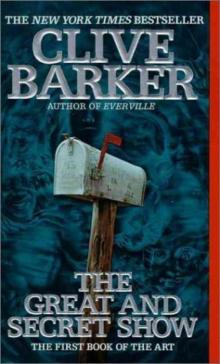 The Great and Secret Show
The Great and Secret Show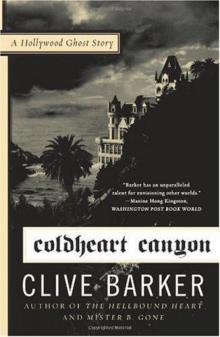 Coldheart Canyon: A Hollywood Ghost Story
Coldheart Canyon: A Hollywood Ghost Story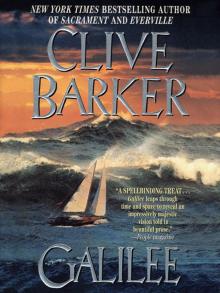 Galilee
Galilee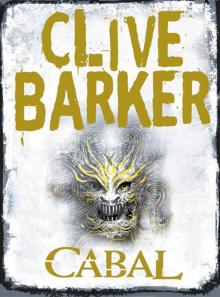 Cabal
Cabal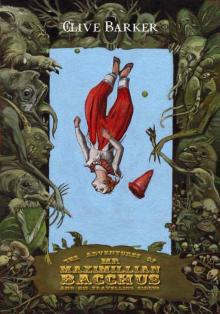 The Adventures of Mr. Maximillian Bacchus and His Travelling Circus
The Adventures of Mr. Maximillian Bacchus and His Travelling Circus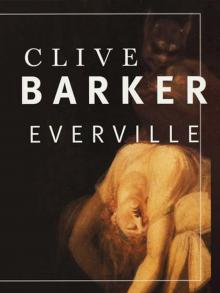 Everville
Everville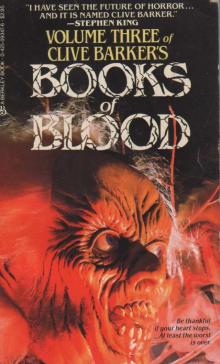 Books of Blood: Volume Three
Books of Blood: Volume Three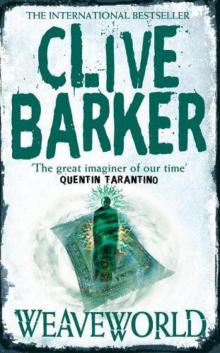 Weaveworld
Weaveworld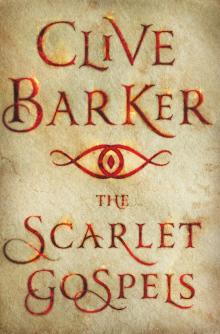 The Scarlet Gospels
The Scarlet Gospels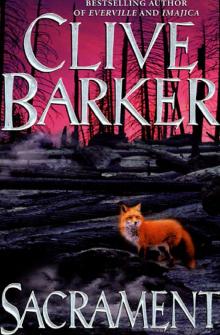 Sacrament
Sacrament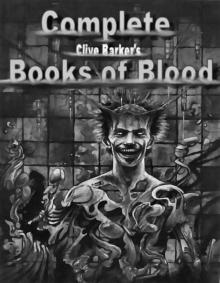 Books of Blood: Volumes 1-6
Books of Blood: Volumes 1-6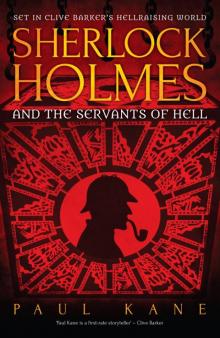 Sherlock Holmes and the Servants of Hell
Sherlock Holmes and the Servants of Hell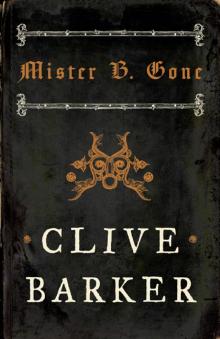 Mister B. Gone
Mister B. Gone Imajica
Imajica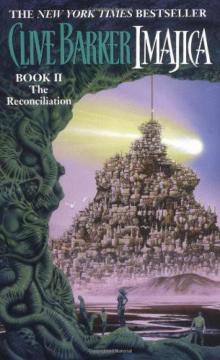 The Reconciliation
The Reconciliation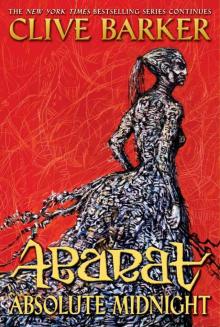 Abarat
Abarat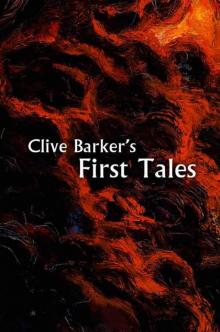 Clive Barker's First Tales
Clive Barker's First Tales The Hellbound Heart
The Hellbound Heart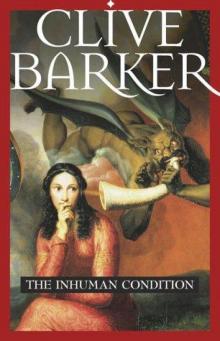 The Inhuman Condition
The Inhuman Condition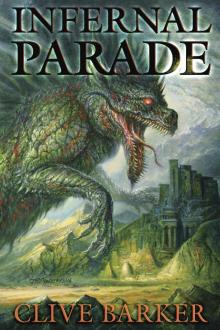 Infernal Parade
Infernal Parade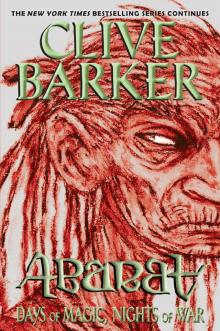 Days of Magic, Nights of War
Days of Magic, Nights of War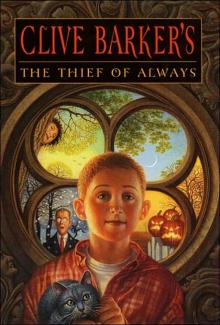 The Thief of Always
The Thief of Always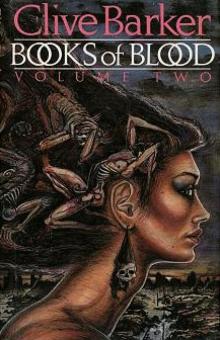 Books of Blood Vol 2
Books of Blood Vol 2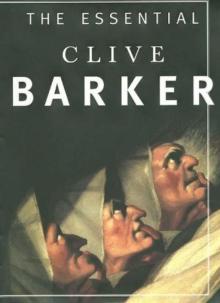 The Essential Clive Barker
The Essential Clive Barker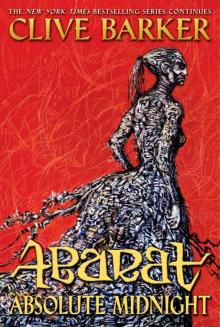 Abarat: Absolute Midnight a-3
Abarat: Absolute Midnight a-3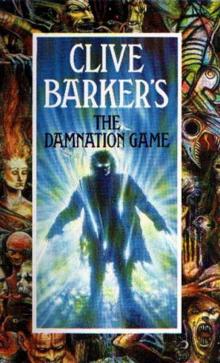 The Damnation Game
The Damnation Game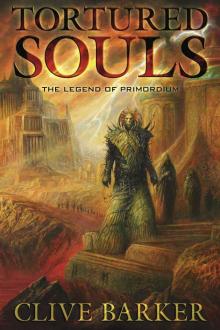 Tortured Souls: The Legend of Primordium
Tortured Souls: The Legend of Primordium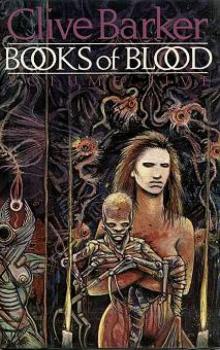 Books of Blood Vol 5
Books of Blood Vol 5 Imajica 02 - The Reconciliator
Imajica 02 - The Reconciliator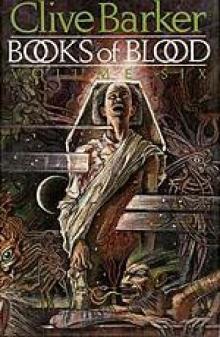 Books Of Blood Vol 6
Books Of Blood Vol 6 Imajica 01 - The Fifth Dominion
Imajica 01 - The Fifth Dominion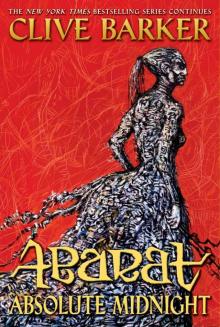 Abarat: Absolute Midnight
Abarat: Absolute Midnight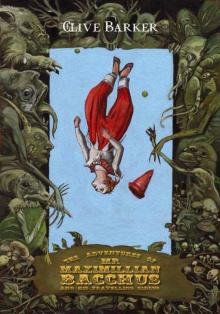 The Adventures of Mr. Maximillian Bacchus & His Traveling Circus
The Adventures of Mr. Maximillian Bacchus & His Traveling Circus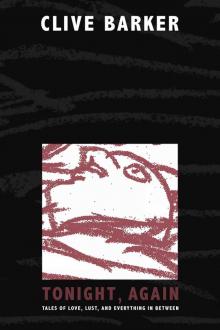 Tonight, Again
Tonight, Again Abarat: The First Book of Hours a-1
Abarat: The First Book of Hours a-1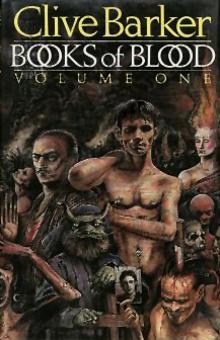 Books Of Blood Vol 1
Books Of Blood Vol 1 Age of Desire
Age of Desire Imajica: Annotated Edition
Imajica: Annotated Edition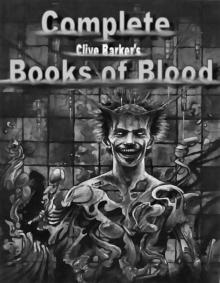 Complete Books of Blood
Complete Books of Blood Gutted: Beautiful Horror Stories
Gutted: Beautiful Horror Stories Shivers 7
Shivers 7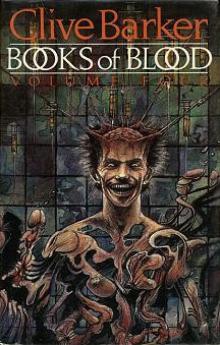 Books Of Blood Vol 4
Books Of Blood Vol 4